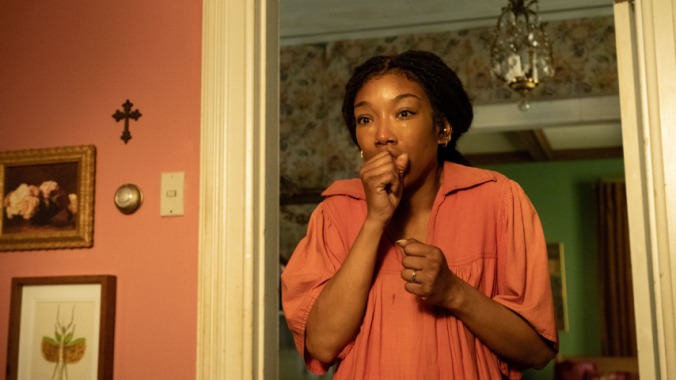The Front Room Weaponizes Incontinence for Its Crappy Horror-Comedy

Max and Sam Eggers’ debut, the hagsploitation flick The Front Room, had me at a loss for words at least a dozen times. That is not necessarily a compliment. Despite being billed as a horror-comedy, the primary emotion The Front Room elicits is one of sheer disbelief. The Front Room is, quite literally, a shit show. But that is less an insult than a fact of the movie’s runtime: the majority of the film depicts an elderly woman soiling herself to dunk on her step-son’s wife. (That being said, it fits that definition in a figurative sense as well.)
Imagine the base themes of filmmaker Michael Haneke’s Amour—the unimaginable horror of watching an aging loved one deteriorate in real time, their body and mind crumbling under the weight of time itself—but reimagined by a boardwalk cartoonist: tone-deaf and skid-marked, stilted and overwrought. There is so much that can be mined from the terrifying experience of aging, but The Front Room is decidedly uninterested in everything that wellspring of tragedy has to offer—save for incontinence, and that is something (perhaps the only thing) it is very, very interested in.
The plot is simple, and thoroughly telegraphed the whole way through: anthropology professor and expecting mother Belinda (played by a belly-bumped Brandy, who does her best with the lackluster script) is understandably fed up with her department’s callous disregard. Less understandably (especially considering the hellhole that is the current academic job market), she promptly quits on the spot not five minutes into the film, as a result of being stood up for a single meeting with the department chair. Consequently, she and her husband Norman (a flat Andrew Burnap) struggle to make ends meet, even though Norman is (to paraphrase about 75% of Burnap’s dialogue) about to get a promotion, babe, I promise.
A solution to the not-quite-happy couple’s financial burdens soon presents itself, in the form of Norman’s hyper-religious, abusive stepmother. Kathryn Hunter’s Solange, who was cursed by a witch to only speak like Senator Claghorn, offers the pair a deal: she’ll leave them her hefty inheritance if they allow her to live in their house for her last few months (or years) alive. Despite Norman’s hesitation, Bedelia accepts the seemingly generous offer and, at Solange’s request, transforms the nursery they had built for their child-to-be into Solange’s new abode. After all, how bad could this monster-in-law possibly be?
Black-veiled and gummily grinning, Hunter is nothing short of committed as Solange, every bit as ludicrous, dedicated, and shameless as any cult classic Nicolas Cage role. Hunter’s performance is The Front Room’s chief and—apart from some well-framed tableaus (courtesy of cinematographer Ave Berkofsky)—only asset.
-

-

-

-

-

-

-

-

-

-

-

-

-

-

-

-

-

-

-

-

-

-

-

-

-

-

-

-

-

-

-

-

-

-

-

-

-

-

-

-








































